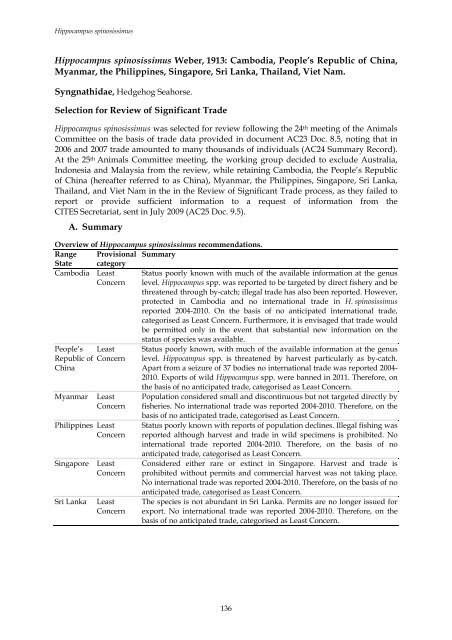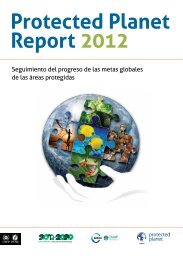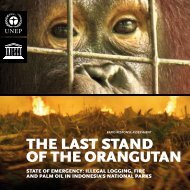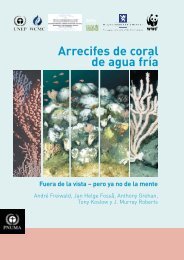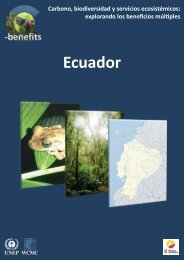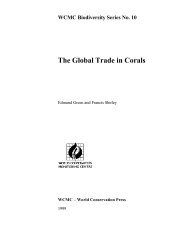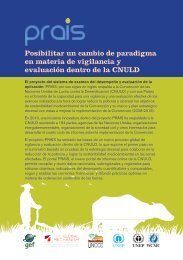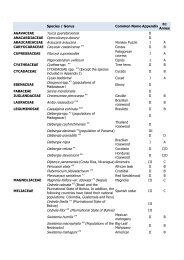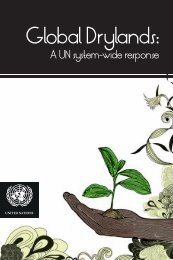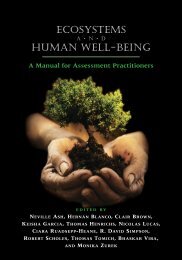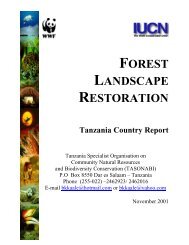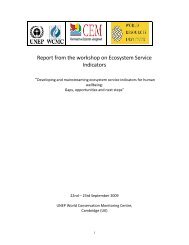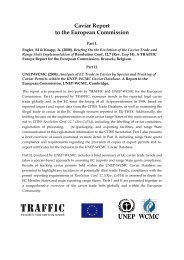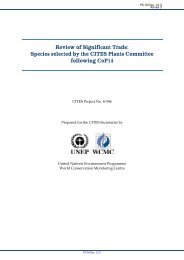2012. Review of Significant Trade - Cites
2012. Review of Significant Trade - Cites
2012. Review of Significant Trade - Cites
Create successful ePaper yourself
Turn your PDF publications into a flip-book with our unique Google optimized e-Paper software.
Hippocampus spinosissimus<br />
Hippocampus spinosissimus Weber, 1913: Cambodia, People’s Republic <strong>of</strong> China,<br />
Myanmar, the Philippines, Singapore, Sri Lanka, Thailand, Viet Nam.<br />
Syngnathidae, Hedgehog Seahorse.<br />
Selection for <strong>Review</strong> <strong>of</strong> <strong>Significant</strong> <strong>Trade</strong><br />
Hippocampus spinosissimus was selected for review following the 24 th meeting <strong>of</strong> the Animals<br />
Committee on the basis <strong>of</strong> trade data provided in document AC23 Doc. 8.5, noting that in<br />
2006 and 2007 trade amounted to many thousands <strong>of</strong> individuals (AC24 Summary Record).<br />
At the 25 th Animals Committee meeting, the working group decided to exclude Australia,<br />
Indonesia and Malaysia from the review, while retaining Cambodia, the People’s Republic<br />
<strong>of</strong> China (hereafter referred to as China), Myanmar, the Philippines, Singapore, Sri Lanka,<br />
Thailand, and Viet Nam in the in the <strong>Review</strong> <strong>of</strong> <strong>Significant</strong> <strong>Trade</strong> process, as they failed to<br />
report or provide sufficient information to a request <strong>of</strong> information from the<br />
CITES Secretariat, sent in July 2009 (AC25 Doc. 9.5).<br />
A. Summary<br />
Overview <strong>of</strong> Hippocampus spinosissimus recommendations.<br />
Range Provisional Summary<br />
State category<br />
Cambodia Least Status poorly known with much <strong>of</strong> the available information at the genus<br />
Concern level. Hippocampus spp. was reported to be targeted by direct fishery and be<br />
threatened through by-catch; illegal trade has also been reported. However,<br />
protected in Cambodia and no international trade in H. spinosissimus<br />
reported 2004-2010. On the basis <strong>of</strong> no anticipated international trade,<br />
categorised as Least Concern. Furthermore, it is envisaged that trade would<br />
be permitted only in the event that substantial new information on the<br />
status <strong>of</strong> species was available.<br />
People’s<br />
Republic <strong>of</strong><br />
China<br />
Myanmar<br />
Least<br />
Concern<br />
Least<br />
Concern<br />
Philippines Least<br />
Concern<br />
Singapore<br />
Sri Lanka<br />
Least<br />
Concern<br />
Least<br />
Concern<br />
Status poorly known, with much <strong>of</strong> the available information at the genus<br />
level. Hippocampus spp. is threatened by harvest particularly as by-catch.<br />
Apart from a seizure <strong>of</strong> 37 bodies no international trade was reported 2004-<br />
2010. Exports <strong>of</strong> wild Hippocampus spp. were banned in 2011. Therefore, on<br />
the basis <strong>of</strong> no anticipated trade, categorised as Least Concern.<br />
Population considered small and discontinuous but not targeted directly by<br />
fisheries. No international trade was reported 2004-2010. Therefore, on the<br />
basis <strong>of</strong> no anticipated trade, categorised as Least Concern.<br />
Status poorly known with reports <strong>of</strong> population declines. Illegal fishing was<br />
reported although harvest and trade in wild specimens is prohibited. No<br />
international trade reported 2004-2010. Therefore, on the basis <strong>of</strong> no<br />
anticipated trade, categorised as Least Concern.<br />
Considered either rare or extinct in Singapore. Harvest and trade is<br />
prohibited without permits and commercial harvest was not taking place.<br />
No international trade was reported 2004-2010. Therefore, on the basis <strong>of</strong> no<br />
anticipated trade, categorised as Least Concern.<br />
The species is not abundant in Sri Lanka. Permits are no longer issued for<br />
export. No international trade was reported 2004-2010. Therefore, on the<br />
basis <strong>of</strong> no anticipated trade, categorised as Least Concern.<br />
136


